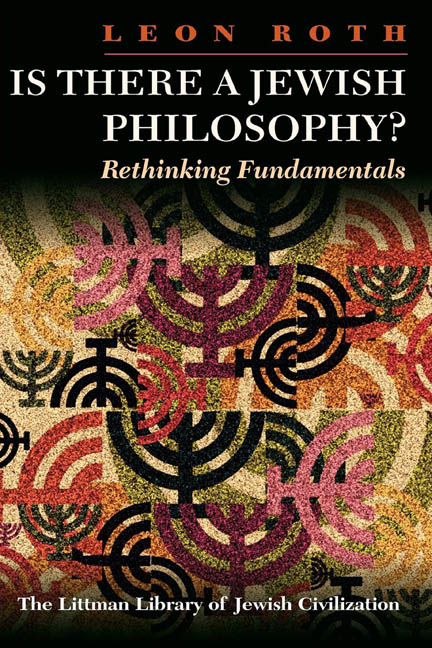Book contents
- Frontmatter
- Dedication
- Contents
- Publisher's Note
- Foreword
- Note
- Is there a Jewish Philosophy?
- Imitatio Dei and the Idea of Holiness
- Jewish Thought as a Factor in Civilization
- The Significance of Biblical Prophecy for Our Time
- Some Reflections on the Interpretation of Scripture
- Baruch Spinoza: His Religious Importance for the Jew of Today
- Judaism: The Elements
- Authority, Religion, and Law
- Moralization and Demoralization in Jewish Ethics
- Mysticism, Thick and Thin
- Back To, Forward From, Ahad Ha'am?
- Maimonides
- Bibliography of the Writings of Leon Roth
- Index
Some Reflections on the Interpretation of Scripture
- Frontmatter
- Dedication
- Contents
- Publisher's Note
- Foreword
- Note
- Is there a Jewish Philosophy?
- Imitatio Dei and the Idea of Holiness
- Jewish Thought as a Factor in Civilization
- The Significance of Biblical Prophecy for Our Time
- Some Reflections on the Interpretation of Scripture
- Baruch Spinoza: His Religious Importance for the Jew of Today
- Judaism: The Elements
- Authority, Religion, and Law
- Moralization and Demoralization in Jewish Ethics
- Mysticism, Thick and Thin
- Back To, Forward From, Ahad Ha'am?
- Maimonides
- Bibliography of the Writings of Leon Roth
- Index
Summary
I HAVE first to offer an apology for an unintentional plagiarism in my title. ‘The Interpretation of Scripture’, as you all know and as I remembered too late, is the name of the contribution to the famous volume of essays and reviews made nearly a hundred years ago by Benjamin Jowett. Jowett was then Regius Professor of Greek at Oxford, but ‘owing to his having incurred suspicions of heresy by the liberality of his religious opinions, he was deprived for ten years'-I am quoting the Dictionary of National Biography-'of the emoluments of his office’.
Some years later, in r870, Jowett became Master of Balliol, the college to which in r879 Claude Montefiore was admitted as an undergraduate; and there is thus some connection, howbeit a distant and tenuous one, between at least the title of my address and the distinguished scholar and religious leader in whose honour it is being delivered.
Having established the connection, however, I shall not dwell on it, since-if I may quote the DNB again-'Jowett's essay on the Interpretation of Scripture only served to increase the suspicion of heresy entertained against him.’ I can only pray that you will be kinder, or I luckier.
In this lecture I propose inviting your attention to a matter which, in one form or another, is always cropping up. It is an old-fashioned problem and does not bother everyone; but it is at the bottom of most disputes on scriptural subjects and indeed on many other subjects too. Someone expresses an opinion and backs it up with a biblical quotation. His friend produces another opinion and another quotation. What are we to do about it? An opinion is an opinion and a quotation is a quotation. Are there any grounds for choosing between them?
As a fact we do choose between them. We follow the one and reject the other. But when it comes to justifying our choice we are almost always at a loss. We cultivate a blind eye. We look the difficulty firmly in the face, and pass on.
But the difficulty remains, and it is not a theoretical one only. We all know, and we have it too on high authority, that ‘the devil can cite Scripture for his purpose'; but when we meet such a one-'an evil soul producing holy witness ’-how can we hope to set about refuting him?
- Type
- Chapter
- Information
- Is There a Jewish Philosophy?Rethinking Fundamentals, pp. 80 - 94Publisher: Liverpool University PressPrint publication year: 1999

